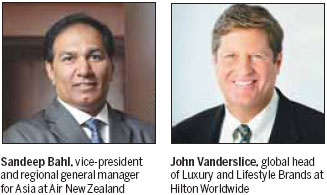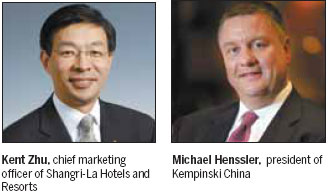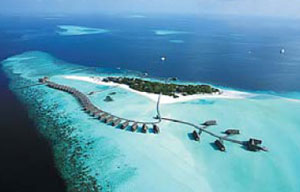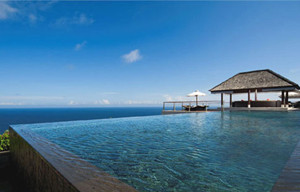More than just journeys, top travel sector aims to create experiences


To cater to an increasingly diverse market, the luxury travel industry is seeking to create unique experiences rather than just focusing on tours of iconic landmarks and lavish shopping sprees.
Air New Zealand is no exception, said a senior executive from the company.
"For airlines, luxury is not something that only exists in products but it includes the ideas and the way we operate to better serve our customers," said Sandeep Bahl, vice-president and regional general manager for Asia at Air New Zealand.
Bahl said the "luxury experience" starts with the first contact and continues throughout the entire process.
"It lies in our exclusive services, ranging from the country's best-known lamb and beef and delicate wines to the high-end in-flight entertainment to the comfortable cabin environment," Bahl said.
"We aim to offer our customers a taste of New Zealand - natural and fabulous."
To create a distinctive experience during the flight, the airline also provides the nuclear family with an independently developed innovation called Skycouch, a seat that lies flat to combine three economy-class seats into one.
The Skycouch brand is currently available on its 777-300 aircraft, which operate routes between New Zealand, the United States and the United Kingdom.
"We are able to generate a well-being effect, not only for our travelers but also for those involved in creating this travel experience," he added.
In 1999, the airline became a member of the Star Alliance.
For its third consecutive year, the airline was last year awarded Airline of the Year for outstanding customer service by Air Transport World, the leading monthly magazine covering the global airline industry.
Based in Auckland, New Zealand, the airline employs 11,000 staff around the globe and operates passenger flights to 27 domestic and 29 international destinations in 15 countries across Asia, Europe, North America, and Oceania.
Asia market
The airline is now shifting its focus to the emerging wealthy class in Asia-Pacific region.
"Wealthy and more-educated travelers are the driving forces for the rise of luxury travel in the region," he said.
"These travelers use luxury as a symbol of success, which reflects their concerns and aspirations for a better world."
According to the company, most of its flights from Asia use Boeing 777-200 aircraft, which offer luxury business class and premium economy class seating.
Its crews are all trained in New Zealand, including nearly 100 Shanghai-based Chinese members, who serve as cultural ambassadors between the two countries.
Meanwhile, the trends of luxury travel in the market are diverse, he added.
For instance, Chinese travelers are much more experienced and sophisticated now.
"They prefer to travel in small groups rather than on a full package tour," Bahl said.
Today's travelers demand more freedom and flexibility, he said.
"They love such activities as golfing, cruising, sailing, trekking, cycling and photographing," Bahl said.
To meet the shifting needs of the market, the airline will add its first Boeing 787-9 Dreamliner to its fleet next year.
It will also begin a 500-million-yuan ($76 billion) revamp of its Boeing 777-200 fleet to deliver the most-innovative and advanced technologies across its long-haul fleet.
For the Chinese market, the airline will continue to accommodate frequent fliers between the two countries, Bahl said.
Feeling 'human'
Another sector closely related to luxury travel, hotels also play an important role in making a perfect journey.
"There is an intricate link between luxury hospitality and the luxury travel market," said John Vanderslice, global head of Luxury and Lifestyle Brands, Hilton Worldwide.
"Nowadays, consumers' expectations have changed, and it is no longer just about the quality of the product or service but also the quality of the experience.
"We are focused on ensuring the consistent delivery of our brand promises throughout every one of our properties."
Kent Zhu,chief marketing officer of Shangri-La Hotels and Resorts said he is confident about the Chinese market.
"This is the fourth year for us to participate in the ILTM. This year, we will have 16 luxury hotels offering high-quality products and services to our VIP buyers, planners and luxury travel suppliers around the world.
"Later this year, one of our most anticipated openings will be the Shangri-La Hotel at The Shard in London, the first elevated hotel in the city," he said.
Michael Henssler, president of Kempinski China said that Chinese travelers are looking for customized and exclusive luxury.
"We will continue to follow a quality-oriented strategy that is evident in our latest opening in the heart of Shanghai's financial district."
"All our employees are culturally educated through cross-training in our Chinese properties as well as our awarded people training and development program."
Alex Kassatly, general manager of the Conrad Beijing, said the hotel's role in the field is not to be pretentious but to always focus on the human element.
The human touch and connection is "ongoing all the time" during a stay at the Conrad hotel, from the first greeting of the doormen and bellboys to the concierge at the front desk, Kassatly said.
"Luxury travelers are more educated and know what they are looking for," he said, adding that hoteliers need to anticipate their needs and exceed their expectations.
To this end, Conrad, part of Hilton Worldwide, has launched the Conrad Concierge service, an application that is available for download from the iPhone app store or Google Play.
It enables travelers to personalize and pre-arrange details related to their hotel stay via smartphone, such as making a reservation at the hotel restaurant, ordering room service and booking transportation.
Also, as an innovation in the hotel industry, Conrad hotel guests are now able to choose their in-room amenities.
Before arrival at a Conrad property, they will receive an email list of amenity options to choose from.
"This added level of personalization and convenience furthers our promise of smart luxury," Kassatly said.
 |
|















